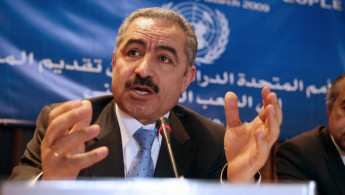Palestinian PM urges African Union to withdraw Israel's observer status
Palestinian prime minister Mohammed Shtayyeh on Saturday urged the African Union to withdraw Israel's observer status as heads of state from the 55-member body met for a two-day summit.
"Israel should never be rewarded for its violation and for the apartheid regime it does impose on the Palestinian people," he said.
The relationship with Israel is a rare point of contention for a body that values consensus and is expected to dominate the Addis Ababa summit this weekend.
The dispute erupted last July when Moussa Faki Mahamat, chair of the African Union Commission, accepted Israel's accreditation to the bloc.
Powerful AU member states, notably South Africa, protested the decision, saying they had not been properly consulted and that the move contradicted numerous AU statements - including from Faki himself - supporting the Palestinian Territories.
Earlier on Saturday Faki said the AU's commitment to the Palestinian push for independence was "unchanging and can only continue to go stronger".
He defended his decision however, saying it could be "an instrument in the service of peace" and called for "a serene debate" on the issue.
The summit could also see a vote on whether to back or reject Faki's decision.
The accreditation handed Israeli diplomats a victory they had been chasing for nearly two decades, with the foreign ministry describing its previous exclusion as an "anomaly".
Israel was previously accredited at the Organisation of African Unity (OAU), but lost that status when the body was disbanded and replaced by the AU in 2002.
The Israeli government attributed the snub to the Libyan leader Moamer Kadhafi, who held major sway at the AU until his death in 2011.
Seventy-two countries, regional blocs and organisations are already accredited, including North Korea, the European Union and UNAIDS, according to the AU's website.





 Follow the Middle East's top stories in English at The New Arab on Google News
Follow the Middle East's top stories in English at The New Arab on Google News


